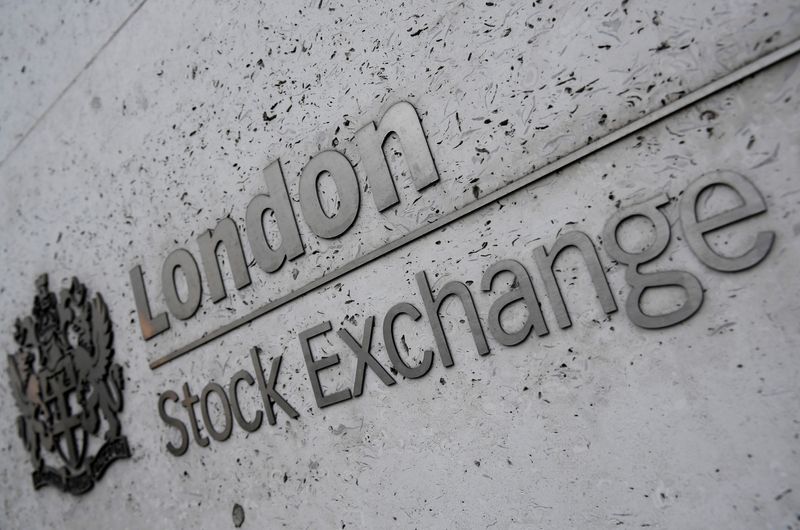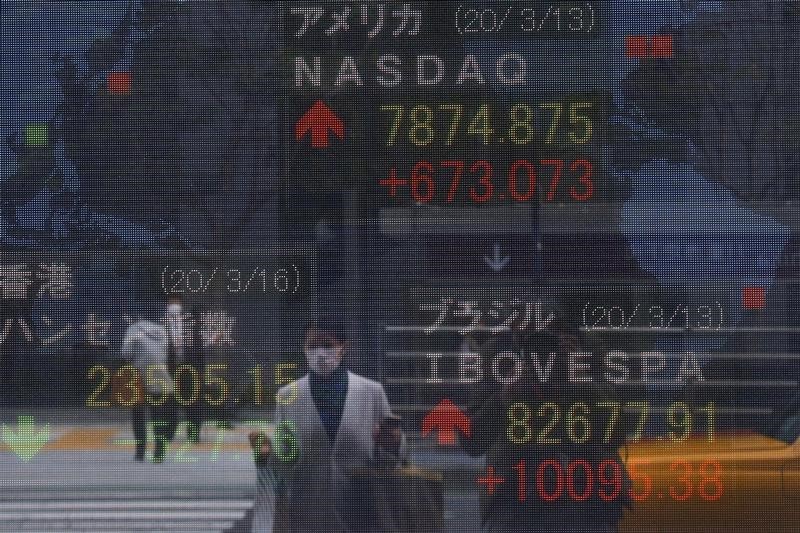By Tom Arnold and Tom Westbrook
LONDON/SINGAPORE (Reuters) - World shares edged lower on Friday, and were on course for their worst week in more than two months, though gains in safer assets like bonds and the dollar were muted as investors awaited U.S. jobs data to see if it triggers a bigger sell-off.
The pan-European STOXX 600 index added 0.4%, rebounding from its worst day in more than a month a day before amid a tech-led plunge on Wall Street on Thursday.
Data showed German industrial goods orders rose by a smaller-than-expected 2.8% on the month in July, undermining hopes of recovery for Europe's largest economy from the coronavirus shock.
MSCI's broadest index of Asia-Pacific shares outside Japan fell 1.3% and looked set to snap a six-week winning streak with its biggest weekly loss since April. Japan's benchmark Nikkei share average closed down 1.1%.
The MSCI world equity index, which tracks shares in 49 countries and had touched record highs earlier on Thursday, shed 0.1%.
"Stock market valuation is rich on a stand-alone basis, but far less extreme compared to other asset classes. Hence, it's likely a bit too soon to be calling the next bear market even though September 3 did mark the top of the equity market back in 1929," said Jeroen Blokland, portfolio manager at Robeco.
Futures were under pressure, but not as much as earlier in the session. Nasdaq 100 futures were down 0.8% and S&P 500 futures down 0.2%.
Focus is now on U.S. payrolls figures due at 1230 GMT, which could be a selling trigger if an expected slowdown in hiring is deeper than forecast.
"I don't think a huge number of investors will be adjusting their positions ahead of the U.S. payroll data but because of yesterday's sell-off there will be a bit more sensitivity to the data," said James Athey, investment director at Aberdeen Standard Investments.
"U.S. jobs data has been pretty consistently awful in a big picture sense. Fundamentally, there is nothing that can happen in payrolls that can tell you much more about the trajectory of the economy."
Foreign exchange markets were on edge at the possibility and a safety bid helped the dollar cling to gains that have it headed for its best week in more than two months. [FRX/]
The euro, which has fallen from a 28-month peak above $1.20 on talk the European Central Bank is concerned about its strength, seems to have eased its slide for now, and last sat at $1.1839.
The yen was steady at 106.14 per dollar and bonds pared what was a pretty modest rise overnight, given the sell-off in the equity market.
Elsewhere, Turkey's lira weakened for a fifth straight session to a new record low as pressure rose on the central bank to tighten credit amid stubbornly high inflation.
Benchmark U.S. 10-year bond yields rose about 2 basis points on Friday, having fallen overnight. [US/]
German yields stabilised, having fallen the day before on equity sell-offs.
TECH TUMBLE
Thursday's tumble was the biggest one-day percentage drop on the tech-focused Nasdaq 100 since March and the darling stocks of recent months were hit hardest. (N)
Still, the plunge in Apple (NASDAQ:AAPL), Tesla (NASDAQ:TSLA) and Microsoft (NASDAQ:MSFT) only wound the Nasdaq back as far as where it sat last Tuesday. It is still up 28% for the year so far and 73% higher than its March trough.
"No single factor sparked the sell-off," said Kerry Craig, Global Market Strategist at J.P. Morgan Asset Management, citing more general worries the rally had run too far, too fast.
"However, this is unlikely to be a repeat of the tech wreck of the late 1990s, given how much the market and sector have changed," he added.
Tech selling in Asia was limited. In South Korea Samsung (KS:005930) fell 1.4% and there was modest pressure on Apple suppliers in Shanghai and Taipei. But falls in consumer staples and financials led losses on the Hong Kong and China bourses.
In commodity markets, oil was headed for its largest weekly drop since June amid worries about demand as the U.S. summer driving season draws to a close.
Brent crude futures were flat at $44.07 a barrel and U.S. crude was also trading sideways $41.38 a barrel. [O/R]

Gold added 0.3% as investors sought out the safety of the precious metal ahead of the U.S. non-farm payrolls data. [GOL/]
